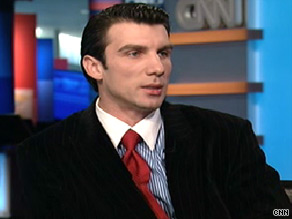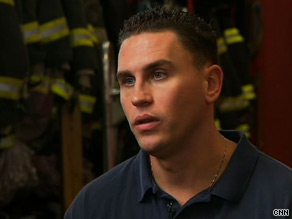Sunday, October 4, 2009
Do You Have to be an Amateur to Be a Hero?

You may have seen the video. A Bronx, New York apartment building is on fire. A man, a civilian is on the top of the fire escape outside a fourth floor window. A firefighter hands him an unconscious 4 year-old boy, and he begins to walk down the fire escape. At the next landing he stops, lies the boy down and does something for a few seconds. Then he gives the thumbs up sign and yells "he's OK."
The man is Horia "Billy" Cretan, 33. He is a Romanian immigrant who owns an electronics store in the building. When the fire broke out late Wednesday afternoon, he heard the boy screaming and went up the fire escape to try to get to him. After firefighters arrived, one went into the apartment and handed the boy out to Cretan, who has become something of an instant hero as the video of the
 rescue circulates.
rescue circulates.But, of course, there are two heroes in this story. Cretan is getting a lot of attention because he is a civilian who risked his own life for a little boy, and because the rescue was captured on video. Getting less attention is Jimmy Senk, the Bronx firefighter who entered the burning apartment and found the boy after he, as young children often do, moved away from the window just as Senk arrived on a ladder to rescue him. Senk went in the window next to where the boy wound up, and so handed him to Cretan rather than take him down the ladder.
Interestingly, this is not the first person Cretan has rescued from a fire. When he was 12, he rescued his own sister from a fire that killed his father. This makes me wonder whether he was motivated more by his own experience of fear and loss from his childhood or by his own experience of success in rescuing someone before. Either way, you have to imagine that this incident triggered some feelings and reactions related to that past trauma.
Senk, on the other hand, doesn't seem too phased. The fact of the matter is, firefighters are trained to do this. A successful rescue is a triumph, not a trauma. Firefighters are prepared for the fact that they will be working in burning buildings. The rest of us expect our buildings to, well, not be on fire. So an experience of successfully saving someone from a burning building, while joyous for everyone, is also traumatic for civilians. It isn't, necessarily, for firefighters.
That difference is part of the reason why Cretan has gotten all the attention. Senk did what he was trained to do. Cretan made a very risky choice that no one would expect of a civilian. Let's not forget, though, that working in a burning environment is dangerous for everyone, and rescuing someone from it is heroic regardless of whether it's your job or not.
Subscribe to:
Post Comments (Atom)
Meet the Quarterback

- Naomi Zikmund-Fisher
- is a clinical social worker, former school Principal and a Crisis Consultant for schools and community organizations. You can learn more about her at www.SchoolCrisisConsultant.com
Contact the Quarterback
Monday Morning Crisis Quarterback on Facebook
Subscribe via email
Quarterback for Kindle
Blog Archive
-
▼
2009
(185)
-
▼
October
(28)
- What Should Really Scare Us This Halloween?
- Pediatric H1N1 Deaths: Compared to What?
- The H1N1 Vaccine Shortage: Hate to Say I Told You...
- The Richmond High Homecoming Attack
- Death at Jellybean Junction
- The Puerto Rican Earthshattering Kaboom
- The Sound and the Fury of the H1N1 Emergency
- Somer Thompson: Hearing the Unthinkable the Wrong Way
- H1N1: It All Becomes Real
- Murder at UConn: What If It's Not a One Time Thing?
- Death at the Marathon
- Balloon Boy and the Punking of America
- Assigning Blame in a Circular Firing Squad
- Carolina Forest High School: Not By the Book
- All's Not Well, Even When It Ends Well
- Odd Odds
- Justice and the Healing of Trauma
- We Have Met the Enemy, and He is Us
- The Blame Game Rides Again
- Surviving a Law & Order Episode
- Cause of Death Matters
- Mont Vernon, NH: It Happens Everywhere
- Pregnant and Scared, But Should You Be?
- The H1N1 Vaccine
- Do You Have to be an Amateur to Be a Hero?
- Abnormally Normal
- Welcome Back Sully
- Aiding Indonesia: Why Tents and Food are Not Enough
-
▼
October
(28)



0 comments:
Post a Comment